

|
 Photo by Philippe Merle 
|
The View from T-Hall Our Changed Agenda By President Joan R. Leitzel Over the last few years at UNH we have invested substantial time and effort to develop long-range plans. We have changed the way we manage the university's financial affairs. We have reconfigured our student recruitment and retention efforts. We are currently in the final stages of developing a long-range institutional academic plan. 
A university is a complex and dynamic organization. Careful planning is essential to making UNH one of the nation's finest public universities. However, all of our planning efforts could not have anticipated the impact of the events of Sept. 11. We are reminded that no matter how carefully we map out plans for the future of our university, we must remain flexible and responsive to the events in the world. Each of us remembers what we were doing when we were informed about the attacks on the World Trade Center. I was having breakfast at the New England Center with Bob Towse '63, a senior executive with Morgan Stanley and a UNH graduate. His company employed more than 3,700 people in the World Trade Center. He left immediately for New York. I went to the Memorial Union to watch the news on television with UNH students. My State of the University speech was scheduled to be delivered at 12:30 p.m. on Sept. 11, but, instead, the community gathered and we reflected on the morning's events, our uncertainty and our gratitude for family, friends and community. In the evening, there were prayer services, a candlelight vigil and a strong feeling of community in the face of terror. Over the next several days, we had a memorial service on campus for professor emeritus Robert LeBlanc, who died in the crash of United Flight #175. Our chaplains led a service of remembrance for all the victims of the attacks. Four UNH alumni lost their lives. Obituaries appear on pages 9-11. We mourned their loss and the loss of loved ones of our students and staff members. There was a blood drive on campus and fund-raising efforts for victims. We did not suspend the class schedule. Rather, faculty members continued to meet with students. In many courses, this semester's syllabus was modified to respond to the Sept. 11 events and the anthrax attacks that followed. Our Counseling Center staff members and chaplains continue to meet with students. Each week, faculty members lead a campuswide discussion on different aspects of the war on terrorism. Topics have included terrorism and geo-politics, women in Islam, media and war and bioterrorism. These forums have brought together faculty members and students in new ways to search for deeper understandings of the issues involved. The university is a rich resource for addressing complex problems. In these most troubling times, it is good to be part of a community of learners. In addition to working with students, faculty members have made themselves available to the news media to help analyze world events and the nation's response. Sara Wolper, a historian of the Middle East, shared her insights into the region on New Hampshire Public Radio. Tom Trout, professor of political science, looked at the impact of terrorism on U.S. foreign policy in a number of interviews. David Frankfurter, professor of history and religious studies, discussed the rise in religious fundamentalism and apocalyptic sects. All three share some of their insights with magazine readers in this issue. (Please see pages 16-19.) We have made some prudent changes in mail handling and have increased security in certain facilities and laboratories. We are providing more support to our international students and those UNH students studying abroad this semester. Some students are understandably confused because faculty members are struggling with and debating many of the issues around the terrorist events. The wave of patriotism across the country is also confusing to many students. Our freshmen were born in 1983, and they have experienced substantially more cynicism toward government and large institutions than they have experienced patriotism. Even with the anxiety and sorrow that have followed the Sept. 11 events, the university remains focused on its primary purpose, to learn. We know now that our work in educating the next generation of world leaders is even more important than ever. We have a stronger sense of service as a community that cares about one another and as a community that is willing to assume responsibility beyond ourselves. In difficult times, positive things can happen. ~ blog comments powered by DisqusCurrent issue | Past issues | Class notes Department archives | Send a letter/news | Address updates Advertise | About UNH Magazine | Alumni home | UNH home University of New Hampshire Alumni Association 9 Edgewood Road Durham NH 03824 (603) 862-2040 alumni@unh.edu |